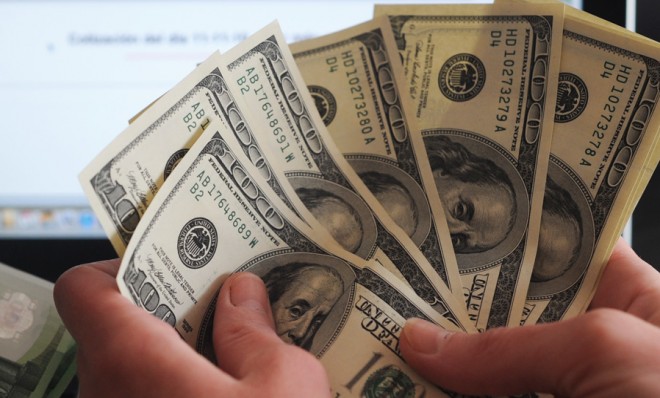Why $100 bills have become one of America's top exports
Foreigners currently hold 66 percent of the U.S. cash in existence

A free daily email with the biggest news stories of the day – and the best features from TheWeek.com
You are now subscribed
Your newsletter sign-up was successful
If you have ever swiped your credit card through a Square-equipped iPhone, you may have walked away convinced that cash's days are numbered. The reality, however, is that there is 42 percent more cash in circulation today than five years ago, according to a new report by the Federal Reserve Bank of San Francisco.
A big reason for the spike in green is that people overseas can't get enough U.S. cash, a phenomenon largely attributed to the never-ending euro crisis, says the report:
As Europe’s crisis worsened in the spring of 2010, U.S. currency holdings rose sharply. And they continued to rise as economic and political turmoil and uncertainty about the future sent Europeans scrambling to convert some of their euros to dollars. According to one estimate, the share of U.S. currency held abroad rose from about 56 percent before the tumultuous events of the past five years to nearly 66 percent in 2012. [Federal Reserve Bank of San Francisco]
Especially in demand are $100 bills. Why, in the parlance of noted baller and shot caller P. Diddy, is it all about the Benjamins?
The Week
Escape your echo chamber. Get the facts behind the news, plus analysis from multiple perspectives.

Sign up for The Week's Free Newsletters
From our morning news briefing to a weekly Good News Newsletter, get the best of The Week delivered directly to your inbox.
From our morning news briefing to a weekly Good News Newsletter, get the best of The Week delivered directly to your inbox.
If you're hoarding cash in anticipation of the end of the world, stacking $100 bills is obviously the most efficient way to go, even if filling a bank vault with coins like Scrooge McDuck would be more fun. Bruce Bartlett, who served under George H.W. Bush and Ronald Reagan, notes in The New York Times that "84 percent of the increase in cash since 1990 has been in the form of $100 bills," and that "65 percent of all $100 bills in existence circulate outside the United States."
Brad Plumer of The Washington Post points out that "many are simply held onto as savings, particularly in volatile nations like Cyprus or Greece."
And is there another group that loves the portability and anonymity of $100 bills? If you guessed criminals, you're right, according to Bartlett:
I seldom use $100 bills for anything except Christmas gifts to nieces and nephews, nor do I ever see people use them in stores. I suspect that most people have the same experience. For large purchases, most law-abiding people use checks or credit cards.
Studies and common sense suggest that those people most likely to use large bills are doing so for nefarious purposes, especially drug dealing. One can easily fit $1 million in $100 bills into a briefcase. [New York Times]
The fact that would-be Pablo Escobars are running around with suitcases filled with $100 bills doesn't mean that exporting cash is a bad thing. Bartlett calls it "an almost costless way of financing a good chunk of our current account deficit" — the broadest measure of a nation's trade balance — kind of like "borrowing money from foreigners that most likely will never have to be paid back, at zero interest."
A free daily email with the biggest news stories of the day – and the best features from TheWeek.com
So how long is this Benjamin boom going to last? According to the Fed report, if economic and political "uncertainty recedes, many people will probably take their $100 bills back to the banks. But if events in Europe or elsewhere around the globe stir more anxiety, appetite for U.S. dollars could surge anew."
Considering the current global economic climate, it's safe to assume that greenbacks will be popular for awhile.
Keith Wagstaff is a staff writer at TheWeek.com covering politics and current events. He has previously written for such publications as TIME, Details, VICE, and the Village Voice.
-
 The environmental cost of GLP-1s
The environmental cost of GLP-1sThe explainer Producing the drugs is a dirty process
-
 Nuuk becomes ground zero for Greenland’s diplomatic straits
Nuuk becomes ground zero for Greenland’s diplomatic straitsIN THE SPOTLIGHT A flurry of new consular activity in Nuuk shows how important Greenland has become to Europeans’ anxiety about American imperialism
-
 ‘This is something that happens all too often’
‘This is something that happens all too often’Instant Opinion Opinion, comment and editorials of the day